
The Cup of Fury is a 1956 non-fiction work [1] by Upton Sinclair [2] describing how alcohol affected the lives of many writers including Jack London, Ben Hecht and Hart Crane.

The Cup of Fury is a 1956 non-fiction work [1] by Upton Sinclair [2] describing how alcohol affected the lives of many writers including Jack London, Ben Hecht and Hart Crane.
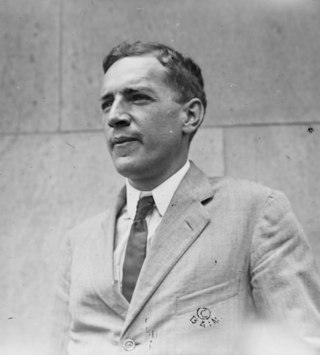
Upton Beall Sinclair Jr. was an American author, muckraker, political activist and the 1934 Democratic Party nominee for governor of California. He wrote nearly 100 books and other works in several genres. Sinclair's work was well known and popular in the first half of the 20th century, and he won the Pulitzer Prize for Fiction in 1943.
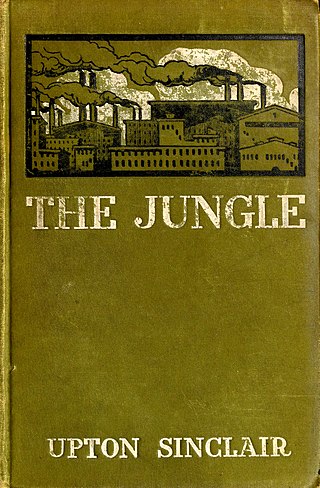
The Jungle is a novel by American muckraker author Upton Sinclair, known for his efforts to expose corruption in government and business in the early 20th century. In 1904 Sinclair spent seven weeks gathering information while working incognito in the meatpacking plants of the Chicago stockyards for the socialist newspaper Appeal to Reason, which published the novel in serial form in 1905. The novel was later published in book format by Doubleday in 1906.

The muckrakers were reform-minded journalists, writers, and photographers in the Progressive Era in the United States (1890s–1920s) who claimed to expose corruption and wrongdoing in established institutions, often through sensationalist publications. The modern term generally references investigative journalism or watchdog journalism; investigative journalists in the US are occasionally called "muckrakers" informally.
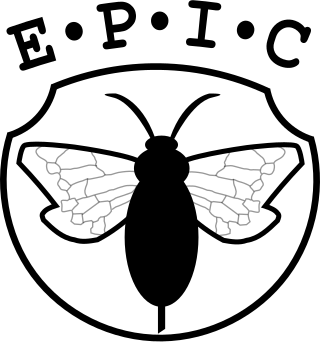
End Poverty in California (EPIC) was a political campaign started in 1934 by socialist writer Upton Sinclair. The movement formed the basis for Sinclair's campaign for Governor of California in 1934. The plan called for a massive public works program, sweeping tax reform, and guaranteed pensions. It gained major popular support, with thousands joining End Poverty Leagues across the state. EPIC never came to fruition due to Sinclair's defeat in the 1934 election, but is seen as an influence on New Deal programs enacted by President Franklin D. Roosevelt.
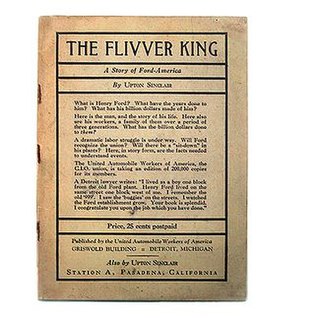
The Flivver King: A Story of Ford-America is a novel by American author Upton Sinclair, published in 1937, that tells the intertwined stories of Henry Ford and a fictional Ford worker named Abner Shutt.
Dragon's Teeth is a 1942 novel by Upton Sinclair that won the Pulitzer Prize for the Novel in 1943. Set in the period 1929 to 1934, it covers the Nazi takeover of Germany during the 1930s.
Greg Mitchell is an American author and journalist. He has written twelve non-fiction books on United States politics and history of the 20th and 21st centuries. He has also written and directed three film documentaries.

Mental Radio: Does it work, and how? (1930) was written by the American author Upton Sinclair and initially self-published. This book documents Sinclair's test of psychic abilities of Mary Craig Sinclair, his second wife, while she was in a state of profound depression with a heightened interest in the occult. She attempted to duplicate 290 pictures which were drawn by her brother. Sinclair claimed Mary successfully duplicated 65 of them, with 155 "partial successes" and 70 failures. In spite of the author's best efforts, the experiments were not conducted in a controlled scientific environment.
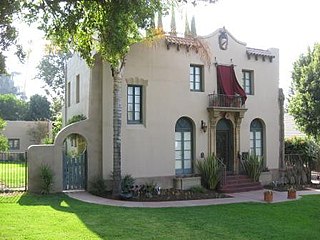
The Upton Sinclair House is a historic house at 464 N. Myrtle Avenue, Monrovia, California. Built in 1923, it was the home of American novelist Upton Sinclair (1878-1968) between 1942 and 1966, and is where he wrote many of his later works. It was listed on the National Register of Historic Places and was declared a National Historic Landmark in 1971. It is a private residence.
The Liberty Hill Foundation is a non-profit organization founded by Sarah Pillsbury, heir to the Minnesota Pillsbury baking fortune, along with Anne Mendel, Larry Janss and Win McCormack, in 1976. Its motto is "Change. Not Charity."
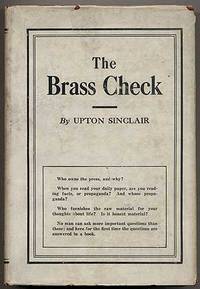
The Brass Check is a muckraking exposé of American journalism by Upton Sinclair published in 1919. It focuses mainly on newspapers and the Associated Press wire service, along with a few magazines. Other critiques of the press had appeared, but Sinclair reached a wider audience with his personal fame and lively, provocative writing style. Among those critiqued was William Randolph Hearst, who made routine use of yellow journalism in his widespread newspaper and magazine business.
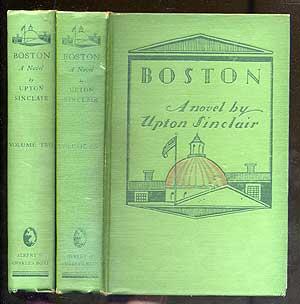
Boston is a novel by Upton Sinclair. It is a "documentary novel" that combines the facts of the case with journalistic depictions of actual participants and fictional characters and events. Sinclair mixed his fictional characters into the prosecution and execution of Sacco and Vanzetti.

The Journal of Arthur Stirling is a novel by author Upton Sinclair, published in 1903. It is written in a first-person perspective, with the main fictional character being Arthur Stirling. Stirling, an unknown poet and writer, sets out to write his first poem, The Captive. He begins writing a journal to help him further his work as an artist—the novel being the journal. The novel begins with an introduction by a character who calls himself, "S."; Stirling already dead by suicide, sends S. a copy of the journal, as well as The Captive for him to read. S. explains the production of the novel in a sense of tribute to Stirling.

The 1934 California gubernatorial election was held on November 6, 1934. Held in the midst of the Great Depression, the 1934 election was amongst the most controversial in the state's political history, pitting conservative Republican Frank Merriam against former Socialist Party member turned Democratic politician Upton Sinclair, author of The Jungle. A strong third party challenge came from Progressive Raymond L. Haight, a Los Angeles lawyer campaigning for the political center. Much of the campaign's emphasis was directed at Sinclair's EPIC movement, proposing interventionist reforms to cure the state's ailing economy. Merriam, who had recently assumed the governorship following the death of James Rolph, characterized Sinclair's proposal as a step towards communism.

The 1930 California gubernatorial election was held on November 4, 1930. For the third consecutive election, the incumbent governor was defeated in the Republican primary. After ousting incumbent C. C. Young in the primary, Mayor of San Francisco James Rolph proceeded to win a landslide over Democratic nominee Milton K. Young. Upton Sinclair was the Socialist nominee for the second consecutive election.
Helicon Home Colony was an experimental community formed by author Upton Sinclair in Englewood, New Jersey, United States, with proceeds from his novel The Jungle. Established in October 1906, it burned down in March 1907 and was disbanded. Sinclair's initial plan for the colony included farms, a communal kitchen, nurseries for children and other services to make it entirely self-sufficient, and would contain about 100 houses on a 400-acre lot. Opinions of the colony were supportive, with the New York Times noting the difficulties of raising a family alone in the city. However, editors also raised concerns over the funds required to purchase as much land as was initially planned, as well as the challenge of operating on an entirely communal basis. The colony eventually opened in a New Jersey school building in October 1906, and about 46 adults and 15 children lived in the community.
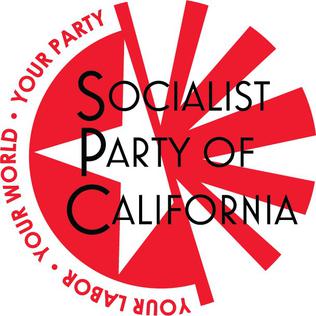
The Socialist Party of California (SPCA) was a socialist political party in the U.S. state of California. Founded in the early 1900s, it had been the state chapter of the Socialist Party USA since being re-chartered in 2011. As of July 2020, it was no longer listed as active by the national organization.

Mary Craig Sinclair (1882–1961) was a writer and the wife of Upton Sinclair.

A Modern Chronicle is a 1910 best-selling novel by American writer Winston Churchill.
The Cup of Fury may refer to:
One of the most amazing books that I have seen is The Cup of Fury by Upton Sinclair. He is a vigorous writer whose works have had far-reaching effects on social and political life in our ...
Approaching his 78th birthday, Upton Sinclair, prolific Puritan of the pen, Pulitzer prize ... last spring a slim crusading - and successful - volume, "The Cup of Fury.